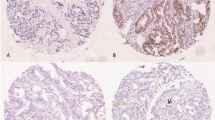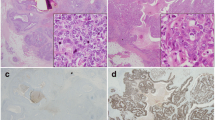Abstract
The wild-type p53 gene suppresses cell proliferation and induces apoptosis when it is transfected into human colon cancer cell lines. Therefore, mutation of the p53 gene, which correlates closely with p53 protein overexpression, would be predicted to activate cell proliferation and limit apoptosis. We tested this hypothesis by correlating p53 protein expression with cell proliferation and apoptosis in 70 neoplasms (29 adenomas and 41 carcinomas) using p53 and Ki-67 immunohistochemical staining and DNA nick end labelling. The p53 immunoreactivity was independent of the Ki-67 positivity. The apoptotic incidence was less frequent (P<0.005) in tumours with diffuse p53 protein overexpression than in those with the sporadic overexpression, defined as p53 staining of isolated or scattered expression. In addition, apoptotic incidence only correlated directly (P<0.05) with Ki-67 positivity in tumours with sporadic p53-protein expression. These results indicate that p53 protein that is expressed sporadically in colorectal neoplasms is probably wild-type protein and induces apoptosis in response to active cell proliferation. In contrast, diffusely overexpressed p53 protein in colorectal neoplasms is probably mutant and correlates with a reduction in apoptotic cell death independently of cell proliferation.
Similar content being viewed by others
References
Baker SJ, Markowitz S, Fearon ER, Willson JKV, Vogelstein B (1990) Suppression of human colorectal carcinoma cell growth by wild-type p53. Science 249:912–915
Bass IO, Mulder JWR, Offerhaus JA, Vogelstein B, Hamilton SR (1994) An evaluation of six antibodies for immunohistochemistry of mutant p53 gene product in archival colorectal neoplasms. J Pathol (Lond) 172:5–12
Bennett WP, Colby TV, Travis WD, Borkowski R, Jones RT, Lane DP, Metcalf RA, Samet JM, Takeshima Y, Gu JR, Vähäkangas KH, Soini Y, Pääkkö P, Welsh JA, Trump BF, Harris CC (1993) p53 protein accumulates frequently in early bronchial neoplasia. Cancer Res 53:4817–4822
Campo E, Calle-Martin O de la, Miquel R, Palacin A, Romero M, Fabregat V, Vives J, Cardesa A, Yague J (1991) Loss of heterozygosity of p53 gene and p53 protein expression in human colorectal carcinomas. Cancer Res 51:4436–4442
Cattoretti G, Becker MHG, Key G, Duchrow M, Schlüter C, Galle J, Gerdes J (1992) Monoclonal antibodies against recombinant parts of the Ki-67 antigen (MIB 1 and MIB 3) detect proliferating cells in microwave-processed formalin-fixed paraffin sections. J Pathol (Lond) 168:357–363
Dolcetti R, Doglioni C, Maestro R, Gasparotto D, Barzan L, Pastore A, Romanelli M, Boiocchi M (1992) p53 over-expression is an early event in the development of human squamous-cell carcinoma of the larynx: genetic and prognostic implications. Int J Cancer 52:178–182
Esrig D, Spruck CH III, Nichols PW, Chaiwun B, Steven K, Groshen S, Chen S, Skinner DG, Jones PA, Cote RJ (1993) p53 Nuclear protein accumulation correlates with mutations in the p53 gene, tumor grade, and stage in bladder cancer. Am J Pathol 143:1389–1397
Gavrieli Y, Sherman Y, Ben-Sasson SA (1992) Identification of programmed cell death in situ via specific labelling of nuclear DNA fragmentation. J Cell Biol 119:493–501
Hall PA, Lane DP (1994) p53 In tumour pathology: can we trust immunohistochemistry? Revisited! J Pathol (Lond) 172:1–4
Hamelin R, Laurent-Puig P, Olschwang S, Jego N, Asselain B, Remvikos Y, Girodet J, Salmon RJ, Thomas G (1994) Association of p53 mutation with short survival in colorectal cancer. Gastroenterology 106:42–48
Hollowood K, Macartney JC (1991) Reduced apoptotic cell death in follicular lymphoma. J Pathol (Lond) 163:337–342
Hollstein M, Sidransky D, Vogelstein B, Harris CC (1991) p53 Mutations in human cancers. Science 253:49–53
Ijiri K (1989) Apoptosis (cell death) induced in mouse bowel by 1,2- dimethlhydrazine, methylazoxymethanol acetate, and γ-rays. Cancer Res 49:6342–6346
Kerr JFR, Wyllie AH, Currie AR (1972) Apoptosis: a basic biological phenomenon with wide-ranging implications in tissue kinetics. Br J Cancer 26:239–257
Kastan MB, Onyekwere O, Sidransky D, Vogelstein B, Craig RW (1991) Participation of p53 protein in the cellular response to DNA damage. Cancer Res 51:6304–6311
Kikuchi-Yanoshita R, Konishi M, Ito S, Seki M, Tanaka K, Maeda Y, Iino H, Fukayama M, Koike M, Mori T, Sakuraba H, Fukunari H, Iwama T, Miyaki M (1992) Genetic change of both p53 alleles associated with the conversion from colorectal adenoma to early carcinoma in familial adenomatous polyposis and non-familial adenomatous polyposis patients. Cancer Res 52:3965–3971
Kuerbitz SJ, Plunkett BS, Walsh WV, Kastan MB (1992) Wild-type p53 is a cell cycle checkpoint determinant following irradiation. Proc Natl Acad Sci USA 89:7941–7495
Lane DP (1992) p53, Guardian of the genome. Nature 358:15–16
Livingstone LR, White A, Sprouse J, Livanos E, Jacks T, Tlsty TD (1992) Altered cell cycle arrest and gene amplification potential accompany loss of wild-type p53. Cell 70:923–935
Maeo S, Ajioka Y, Watanabe H, Kobayashi M, Kobayashi M (1995) The proliferating cell nuclear antigen (PCNA) index correlates with the grade of cytologic atypia in well-differentiated early adenocarcinomas of the large intestine. Pathol Int 45:359–365
Montironi R, Galluzzi CM, Scarpelli M, Giannulis I, Diamanti L (1993) Occurrence of cell death (apoptosis) in prostatic intra-epithelial neoplasia. Virchows Arch [A] 423:351–357
Oohashi Y, Watanabe H, Ajioka Y, Hatakeyama K (1995) p53 Immunostaining distinguishes malignant from benign lesions of the gall-bladder. Pathol Int 45:58–65
Shaw P, Bovey R, Tardy S, Sahli R, Sordat B, Costa J (1992) Induction of apoptosis by wild-type p53 in a human colon tumor-derived cell line. Proc Natl Acad Sci USA 89:4495–4499
Sun X-F, Carstensen JM, St»l O, Zhang H, Nilsson E, Sjödahl R, Nordenskjöld B (1993) Prognostic significance of p53 expression in relation to DNA ploidy in colorectal adenocarcinoma. Virchows Arch [A] 423:443–448
Tsuda H, Hirohashi S (1994) Association among p53 gene mutation, nuclear accumulation of the p53 protein and aggressive phenotypes in breast cancer. Int J Cancer 57:498–503
Wadayama B, Toguchida J, Yamaguchi T, Sasaki MS, Kotoura Y, Yamamoto T (1993) p53 Expression and its relationship to DNA alterations in bone and soft tissue sarcomas. Br J Cancer 68:1134–1139
Watanabe H, Ajioka Y (1988) Pathology of borderline lesion in the large intestine (in Japanese). Pathol Clin Med 6:1280–1292
World Health Organization (1989) Histological typing of intestinal tumors, 2nd edn. Springer, Berlin Heidelberg New York
Yamaguchi A, Kurosaki Y, Fushida S, Kanno M, Yonemura Y, Miwa K, Miyazaki I (1992) Expression of p53 protein in colorectal cancer and its relationship to short-term prognosis. Cancer 70:2778–2784
Yin Y, Tainsky MA, Bischoff FZ, Strong LC, Wahl GM (1992) Wild-type p53 restores cell cycle control and inhibits gene amplification in cells with mutant p53 alleles. Cell 70:937–948
Author information
Authors and Affiliations
Rights and permissions
About this article
Cite this article
Kobayashi, M., Watanabe, H., Ajioka, Y. et al. Correlation of p53 protein expression with apoptotic incidence in colorectal neoplasia. Vichows Archiv A Pathol Anat 427, 27–32 (1995). https://doi.org/10.1007/BF00203734
Received:
Accepted:
Issue Date:
DOI: https://doi.org/10.1007/BF00203734




